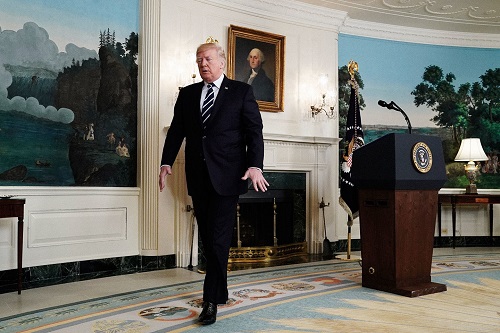Reuters photo
By
Tom Arms
Ambassadors have a clear set of duties and responsibilities: To represent their country and its policies to the host country and to report back to their government the policies of the country to which they have been assigned.
The system requires trust on both sides. That is why ambassadors are specifically forbidden to meddle in the politics of the host country. To do so would completely undermine their position and credibility. How can any host government talk freely with a diplomat who is trying to push them out of power?
Apparently Richard Grenell, the newly-appointed US Ambassador to Germany, failed to read the diplomatic handbook—or at least key sections of it.
No sooner had he been confirmed by the Senate than he gave an interview to far-right Breitbart News in which he said he wanted to “empower other conservatives throughout Europe” and encourage people to rise up against “elites.”
He was immediately attacked by almost every German politician, except those on the far right. Former Social Democrat (SPD) leader Martin Schulz said: “What this man is doing is unprecedented in international diplomacy.”
He added: “If a German ambassador in Washington said, ‘I’m here to strengthen the Democratic Party,’ he would be thrown out immediately.”
Schulz accused Grenell of acting as a representative of a political movement instead of maintaining a neutral stance toward his host country, and later described him as a “far-right colonial official.”
Sahra Wagenknecht, the leader of Germany’s left-wing Die Linke, has also called for Grenell to be withdrawn.
Ambassador Grenell is now backpedalling – to a degree. He tweeted a response to the German fury: “The idea that I’d endorse candidates/parties is ridiculous.” But then he added: “I stand by my comments that we are experiencing an awakening from the silent majority – those who reject the elites & their bubble – led by Trump.”
The Trump Administration is becoming notorious for its diplomatic appointments. Last December the Dutch were up in arms over comments from the US representative to The Hague. Pete Hoekstra had gone on record to say that the Netherlands was peppered with no-go areas and politicians were being burned. When Dutch journalist Wouter Zwart asked him about this, Hoekstra claimed he never made the comments and that they were “fake news”. Zwart then showed him a video of Hoekstra saying exactly what he said he didn’t say. In the very next breath Hoekstra denied that he used the term “fake news” five seconds before. All this was being filmed in a report that went viral and made Hoekstra and the Trump Administration look extremely foolish.
Then there is the case of Ted Malloch, the Anglo-American academic who early in the Trump Administration flew around Europe claiming that he was about to be appointed US ambassador to the European Union and was looking forward to helping to orchestrate its demise. The White House later denied that it ever considered Malloch, but it was slow to do so and the damage was done. It was only last month that the administration got around to nominating Oregon hotelier Gordon Sondland as Washington’s man in Brussels.
Finally, there is Nigel Farage, former UKIP (UK Independence Party) leader, number one Brexiteer and major thorn in the backside for successive British Conservative leaders. One of Donald Trump’s first diplomatic moves was to propose that Farage be appointed British ambassador to the US. Another foreign policy faux pas. The ambassador is meant to represent the government that appoints them, not the other way around.
There is a certain degree of panic that after 17 months in office 44 ambassadorships remain unfilled. Given the quality of those who have either been considered or confirmed, that may actually be a good thing.
Tom Arms
I am a journalist, entrepreneur and historian with extensive experience in print, web and broadcast journalism. I started as a diplomatic correspondent, wrote several books (The Falklands Crisis, World Elections On File and the Encyclopedia of the Cold War), and then in 1987 started my own business (Future Events News Service, www.fensinformation.com) which over 25 years established itself as the world and UK media’s diary. Our strapline was: “We set the world’s news agenda.” I sold FENS in December 2012 but retained the exclusive broadcast rights to all of FENS data. To exploit these rights I set up LookAhead TV which produces unique programmes which “Broadcasts Tomorrow Today” so that viewers can “Plan to Participate.” LookAhead has appeared regularly on Vox Africa, Radio Tatras International, The Conversation and Voice of Africa Radio.
In addition to being a syndicated broadcaster and columnist on global affairs, Tom is also available for speaking engagements and can be contacted on Twitter, Linkedin and email: [email protected].



No Comments Yet!
You can be first to comment this post!